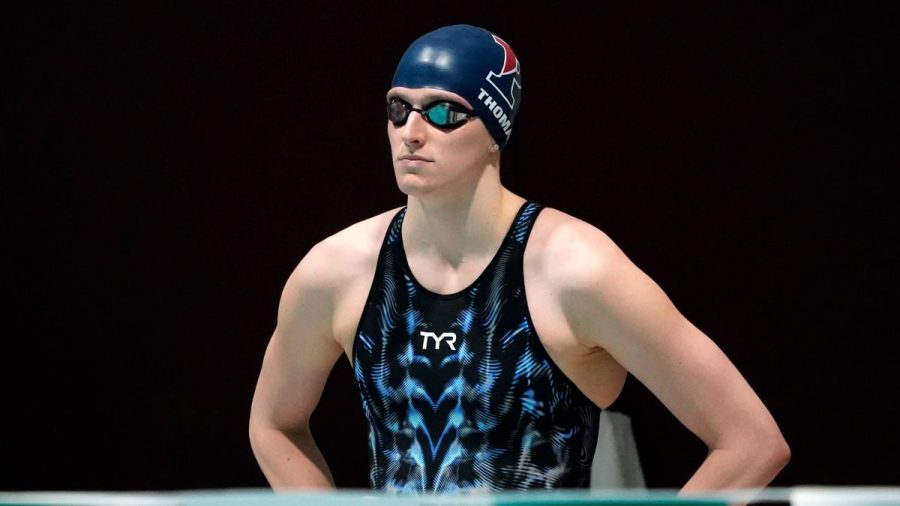UPenn Swimmer Sparks Transgender Rights Debate
Lia Thomas of UPenn sparked controversy after transitioning and competing as a woman.
April 13, 2022
Transgender swimmer Lia Thomas remains controversial as she finishes her collegiate career at the University of Pennsylvania.
Thomas competed for the UPenn men’s team until 2020 before taking the 2020-21 season to transition from male to female.
Many of Thomas’s competitors questioned the legitimacy of her eligibility, and 16 of Thomas’ teammates wrote a letter to the Ivy League and NCAA expressing their disapproval of her competitive status. Protestors outside of the UPenn team also lined up outside the NCAA Swimming Championship to express their disapproval of her competitive status.
Thomas became the national champion in the 500-yard freestyle and finished fifth and eighth in her other events as her competitors continued to express their disapproval throughout the meet.
Thomas adhered to the NCAA guidelines regarding her transition to remain eligible. NCAA policy granted eligibility for trans women that had completed one year of hormone replacement therapy (HRT).
Amid the Thomas controversy, the NCAA announced in 2022 that a trans woman’s eligibility is determined by the national governing body of each sport, meaning Thomas had to adhere to USA Swimming guidelines.
The policy will only admit a swimmer’s eligibility if their concentration of testosterone level remains less than five nom/L for a continuous 36 months. Due to the mid-season policy change, Thomas was eligible to compete at NCAA Championships in March.
One of Thomas’ biggest competitors, Olympian Brooke Forde, stated she had, “no problem” racing the transgender athlete. Forde finished fourth in the event while Thomas finished in first.
Many of the concerns stem from the idea that swimming is an incredibly individual sport. On a soccer team, it takes an entire team effort to score a goal, but at a swim meet, it is the product of a singular swimmer that often wins gold.
Thomas’ teammates expressed concern over the impact transgender athletes have on the sport, stating that she should not be eligible to compete because they believe Thomas is taking “competitive opportunities” from other women on the team.
The male body has tremendous advantages in swimming, and Thomas’ teammates referred to the experience of male puberty. They pointed to her body having permanent advantages, such as height, larger lungs and more strength.
Thomas was an average-ranked swimmer as a male. Since transitioning, she became a top competitor in her given events. According to former Olympian Nancy Hogshead-Makar, women’s times are typically 7%-13% slower than male competitors, and Thomas’ times have lost only 3% in comparison to her times as a male.
Thomas abided by the NCAA policy which permitted her eligibility this season. The organization has been aware of her intention to transition since 2019 but left Thomas to face the fallout of its ruling.
Many athletes are faced with the juxtaposition of being an ally to the LGBTQ+ community and Thomas’ impact on their athletic experience. Many want Thomas to express her most authentic self without shame, but competitors find it difficult to overlook her biological advantage.
There is an influx of athletes identifying as trans across the nation. Leashia Lewis was recently named Director of Diversity, Equity and Inclusion for Unitas, a program of Diversity at Villanova. Lewis has been leading efforts towards making Villanova a safe space for minoritized athletes. The discussion surrounding trans athletes is an ongoing evolution, and Lewis has been working closely in preparation for creating a safe space for potential trans athletes. At Villanova, there is no specific transgender inclusion policy, but according to the University Diversity Statement, “Villanova University will be a diverse community. We commit ourselves to cultivating an academic environment marked by genuine curiosity about different perspectives, ardent receptivity to knowledge generated through intercultural connections, and a genuine sensitivity to the variety of the human experiences marked by domestic and global differences.”
Athletics is currently evaluating its policies with support from Athlete Ally, but universities are having difficulty adapting to the everlasting policy change. Trans inclusion policies were paused due to Thomas’ impact on NCAA policy, but Villanova is taking steps in preparation for having a transgender athlete on campus in the future.
Understanding Trans rights in athletics is an ongoing evolution for both athletes and the community, and within the past year, Thomas has sparked conversations that will impact the NCAA policy and competition for years to come.


